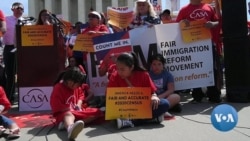ປາກົດວ່າ ພາກສ່ວນທີ່ເປັນສຽງສ່ວນຫຼາຍ ຢູ່ໃນສານສູງສຸດຂອງສະຫະລັດມີຄວາມ
ເຫັນອົກເຫັນໃຈກັບເຫດຜົນຂອງລັດຖະບານທີ່ວ່າ ການສຳຫຼວດສຳມະໂນຄົວ ປີ
2020 ຄວນປະກອບດ້ວຍຄຳຖາມ ໃນການໂອນເປັນສັນຊາດ ເພື່ອຕັດສີນໃຈເອົາຈຳ
ນວນຂອງພວກທີ່ບໍ່ມີເອກະສານ ຢູ່ໃນປະເທດ. ພວກທີ່ຂັດຄ້ານ ພາກັນໂຕ້ແຍ້ງວ່າ ຄຳຖາມດັ່ງກ່າວ ຈະຫັກຫ້າມ ພວກຄົນເຂົ້າເມືອງ ບໍ່ໃຫ້ປະກອບສ່ວນ ໃນການນັບຈຳ
ນວນພົນລະເມືອງ ໂດຍປ່ອຍປະພວກປະຊາຄົມທັງໝົດ ໃນບາງຫົວເມືອງແລະບາງ
ລັດ. ສະລາຕິກາ ໂຮກ ມີລາຍງານວ່າ ກໍລະນີດັ່ງກ່າວ ໄດ້ຕົກມາເຖິງສານສູງສຸດ ລຸນ
ຫຼັງສານລັດຖະບານກາງຫຼາຍແຫ່ງ ໃນນະຄອນນິວຢອກ ແລະກາລີຟໍເນຍ ໄດ້ຢັບຢັ້ງ
ໄວ້ ບໍ່ໃຫ້ມີຄຳຖາມໃໝ່ຕື່ມ. ກະຊວງການຄ້າພວມຊອກຫາຊ່ອງທາງຕ່າວປີ້ນການຕັດ
ສີນໃຈທີ່ວ່ານນີ້ ດັ່ງສາລີ ຈະນຳລາຍລະອຽດມາສະເໜີທ່ານ ໃນອັນດັບຕໍ່ໄປ.
ພວກປະທ້ວງທັງຫຼາຍພາກັນເຕົ້າໂຮມກັນຢູ່ຂ້າງນອກຂອງສານສູງສຸດຂອງສະຫະລັດ
ໃນວັນອັງຄານຜ່ານມາເພື່ອປະທ້ວງຕໍ່ສິ່ງທີ່ເພີ້ມໃສ່ຄຳຖາມໃນດ້ານສັນຊາດໃນບັນດາ
ຄຳຖາມທັງຫຼາຍໃນການສຳຫຼວດສຳມະໂນຄົວ.
ພວກຕໍ່ຕ້ານການເພີ້ມເຕີມດັ່ງກ່າວເວົ້າວ່າ ຄຳຖາມທີ່ວ່ານນັ້ນ ຈະສ້າງຄວາມຢ້ານກົວ
ໃຫ້ແກ່ຫຼາຍໆລ້ານຄົນ ຊຶ່ງສ່ວນໃຫຍ່ຈະແມ່ນພວກຄົນເຂົ້າເມືອງເຊື້ອສາຍສະເປນ.
ທ່ານ ເດລ ໂຮ ທະນາຍຄວາມປະຈຳມະຫາວິທະຍາໄລ ຢູຊີແອລຢູ ກ່າວວ່າ: “ໃນກໍລະ
ນີນີ້ ຄຳຖາມນີ້ ເຈົ້າເປັນສັນຊາດບໍ່? ມັນບໍ່ແມ່ນກ່ຽວກັບ ແຖວຢູ່ໃນແບບຟອມ ມັນກ່ຽວ
ກັບວ່າ ແຕ່ລະຄົນ ຢູ່ໃນອາເມລິກາຈະຖືກນັບຫຼືບໍ່. ການຄຳນວນຂອງລັດຖະບານເອງກໍ
ຄືວ່າ ການບັນຈຸຄຳຖາມຂໍ້ນີ້ລົງໄປ ໃນບົດສຳຫຼວດ ຈະເຮັດໃຫ້ຄົນ 6 ລ້ານ 5 ແສນຄົນ ບໍ່ຕອບຄຳຖາມ.ພວກເຂົາເຈົ້າຈະບໍ່ປາກົດຢູ່ໃນບົດສຳຫຼວດສຳມະໂນຄົວແຫ່ງຊາດຂອງ
ພວກເຮົາ.
ການສຳຫຼວດສຳມະໂນຄົວ ຈະມີຂຶ້ນທົດສະວັດນຶ່ງເທື່ອນຶ່ງ. ທັງຈະໃຊ້ຫຼາຍບ່ອນນັ່ງໃນ
ສະພາຕໍ່າ ແລະຈະໃຊ້ເງິນປະມານ 800 ພັນລ້ານໂດລາ ໃນເງິນທຶນຂອງລັດຖະບານ
ກາງນຳ.
ພວກຕໍ່ຕ້ານຄຳຖາມກ່ຽວກັບ ສັນຊາດ ເວົ້າວ່າ ແຜນການຂອງລັດຖະບານແມ່ນສ້າງ
ຄວາມຢ້ານກົວໃຫ້ພວກຄົນເຂົ້າເມືອງບໍ່ໃຫ້ປະກອບສ່ວນ. ອັນນີ້ມັນອາດລວມທັງປະ
ຊາຄົມເລີຍ ບໍ່ໃຫ້ເຂົ້າຮ່ວມໃນດ້ານການເມືອງຢ່າງເຕັມສ່ວນແລະການໄດ້ຮັບທຶນຂອງ
ລັດຖະບານກາງເພື່ອການສຶກສາ ສຳລັບໂຄງລ່າງພື້ນຖານ ແລະການຮັບໃຊ້ບໍລິການ
ມະຫາຊົນ. ທ່ານນາງນານາ ຈີອຳຟີ ຜູ້ອຳນວຍການບໍລິຫານຂອງອົງການຊາວຜິວດຳ
ສະເພາະເລື້ອງການເຂົ້າເມືອງກ່າວວ່າ: "ການຊຸກຍູ້ຂອງລັດຖະບານ ເພື່ອໃຫ້ມີຄຳຖາມ
ເລື້ອງສັນຊາດແມ່ນພາກສ່ວນນຶ່ງທີ່ເປັນທີ່ຈະແຈ້ງວ່າ ເປັນເລື້ອງກີດກັນເຊື້ອຊາດໃນ
ການນັບຈຳນວນພວກຄົນເຂົ້າເມືອງສີຜິວໜ້ອຍລົງ ລວມທັງພວກເຂົ້າເມືອງຜິວດຳ ເພື່ອ
ແຍກພວກເຮົາອອກຈາກປະຊາຄົມ ອອກຈາກແຫຼ່ງບໍລິການແລະການມີຕົວແທນ."
ສານສູງສຸດແບ່ງແຍກກັນຕາມແນວທາງຂອງອຸດົມການ ມີທ່າທາງວ່າ ຈະລົງຄະແນນ
ສຽງແບບ 5 ຕໍ່ 4 ໂດຍເຂົ້າຂ້າງລັດຖະບານທຣຳ. ຄາດວ່າ ການຕັດສີນໃຈດັ່ງກ່າວ ຈະ
ມີຂຶ້ນໃນເດືອນມິຖຸນາ.
ທ່ານ ຮານສ ວອນ ສະປາກອຟກີ ຈາກມຸນນິທິເຮຮິເຕສ ກ່າວວ່າ:
“ຂ້າພະເຈົ້າຄິດວ່າ ລັດຖະບານຈະໄດ້ຮັບໄຊຊະນະ. ລັດຖະມົນຕີການຄ້າ ມີອຳນາດ
ເຕັມສ່ວນ ພາຍໃຕ້ຂໍ້ບັງຄັບທີ່ຮັບຜ່ານໂດຍສະພາ ເພື່ອໃຫ້ເລືອກເອົາວ່າຄຳຖາມໃດ
ຄວນໃຫ້ມີຢູ່ໃນບົດສຳຫຼວດສຳມະໂນຄົວ. ແລະຂ້າພະເຈົ້າບໍ່ຄິດວ່າ ຂໍ້ອ້າງຕ່າງໆທີ່
ໄດ້ມີຂຶ້ນ ເພື່ອຕໍ່ຕ້ານນັ້ນ ຈະຊົງໂຕຢູ່ໄດ້ ຢູ່ໃນສານດັ່ງກ່າວ.”
ສຳລັບພວກທີ່ສະໜັບສະໜູນການເພີ້ມຄຳຖາມໃສ່ ໂຕ້ແຍ້ງວ່າ ມັນບໍ່ໄດ້ຖາມໄປເຖິງ
ວ່າ ຄົນຜູ້ນັ້ນມາຢູ່ປະເທດນີ້ຢ່າງຖືກຕ້ອງຕາມກົດໝາຍຫຼືບໍ່ ແລະຍິ່ງໄປກວ່ານັ້ນ ຄຳ
ຖາມທັງໝົດຢູ່ໃນບົດສຳຫຼວດ ແມ່ນເລື້ອງລັບ ຊຶ່ງໝາຍຄວາມວ່າກົມສະຖິຕິ ຈະບໍ່ສາ
ມາດທີ່ຈະເປີດເຜີຍໃຫ້ແກ່ອົງການໃດຂອງລັດຖະບານກາງ ໄດ້.
Demonstrators gathered outside the U.S. Supreme Court on Tuesday to protest the addition of the citizenship question in the census questionnaire.
Opponents of the addition say the question will intimidate millions of people, mostly Hispanic immigrants.
(Dale Ho, ACLU Attorney)
"This case, this question, 'Are you a citizen?' It's not about a line on a form. It's about whether or not everyone in America counts. The government's own estimate is that putting this question on the census is going to cause 6.5 million people not to respond. They're just going to vanish from our nation's population count."
The census is conducted once in a decade and is used to allot seats in the U.S. House of Representatives and distribute some $800 billion in federal funds. Opponents of the citizenship question say the administration's plan is to intimidate immigrants from participating. This could deprive whole communities of adequate political representation and federal funds for education, infrastructure and public services.
(Nana Gyamfi, Executive Director of BAJI (Black Alliance for Just Immigration)
"The administration's push for a citizenship question is part and parcel of a clearly racist scheme of undercounting immigrants of color, including black immigrants, to deprive us of our community, of resources and representation. "
The Supreme Court, split along ideological lines, appears ready to vote 5-4 in favor of the Trump administration. Its decision is expected in June.
(Hans von Spakovsky, Heritage Foundation)
I think the government's going to win. The secretary of commerce has complete authority under a statute passed by Congress to decide what the questions are that are on the census. And I don't think that the claims that have been made against it are going to basically stand up in front of the court."
Those who support the addition of the question argue that it does not ask if a person is in the country legally or illegally, and furthermore, that all the answers in the census are confidential, which means the Census Bureau cannot share them with other federal agencies.





